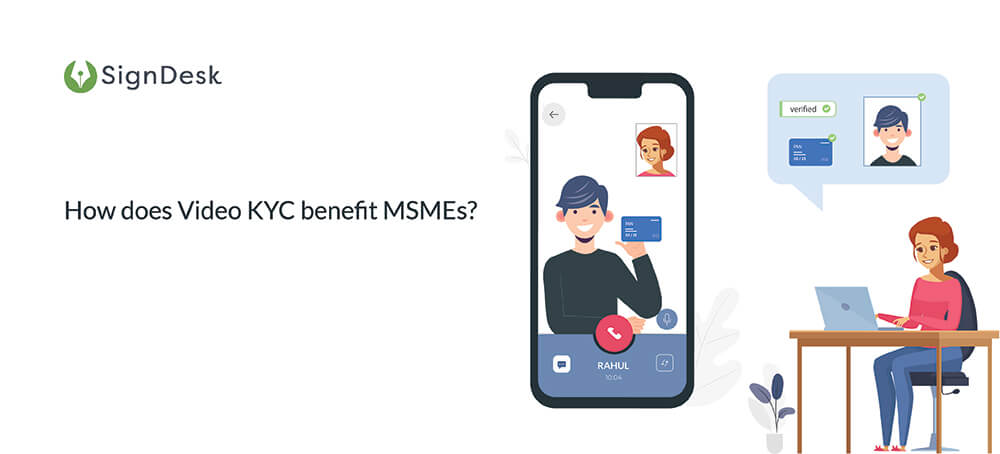RBI, in a recent notification, approved the use of Video KYC for the purposes of verifying customer identity. The notification was passed after a recommendation by an expert committee set up by RBI to investigate the problems faced by Micro, Small, and Medium Enterprises (MSMEs) in India.
Video KYC appears, at the outset, to be mainly beneficial to the customers. However, we shall now examine why it benefits micro-businesses the most.

What are MSMEs ?
The Ministry of Micro, Small, and Medium Enterprises defines MSMEs as those enterprises whose investment in plant and machinery is between Rs. 25 lakh and Rs. 10 crores.
Additionally, MSMEs could also be those enterprises engaged in the providing or rendering of services, whose investment in equipment is between Rs. 10 lakh and Rs. 5 crores.
Essentially, this means that Micro, Small, and Medium Enterprises are precisely that – Micro, Small, and Medium. They are enterprises with access to fewer resources, less capital, and serving a relatively small customer base.
How did we get here?
To understand the impact of this notification on MSMEs, let’s first examine the state of small businesses in India.
India has traditionally been a hub for cottage and small businesses, and this is truer now than it ever was. As per official estimates, there are currently over 63.05 million micro industries, 0.33 million small enterprises, and about 5,000 medium enterprises in the country.
The commercial data and analytics firm Dun & Bradstreet (D&B) estimates that for every 100 companies in India, there are more than 95 micro-enterprises.
However, things are not going well for the majority of these enterprises. They have been racked with problems such as – Lack of access to finance, availability of adequate infrastructure, lack of skilled labour, and inadequate power supply, to name a few.
In fact, it is estimated that the micro enterprises without access to external finances witness only a two percent return on Capital Employed.
Government to the rescue
MSMEs may appear to be doomed at this point, but fortunately, the government is not too keen on allowing this to happen.
A number of policy initiatives and schemes have been incepted and executed to assist the growth and consolidation of micro-businesses. These include – The Udyog Aadhaar Memorandum, The Framework for Revival and Rehabilitation of MSMEs, ATI Scheme, Credit Guarantee Scheme, etc.
One of the government’s main initiatives in this regard revolves around digital payments. The Ministry of Micro, Small, and Medium Enterprises states in its 2018-19 report that – “ Promotion of digital payments has been accorded highest priority by the Government of India to bring each and every segment of our country under the formal fold of digital payment services. “
In view of this, it does not come as a great surprise that the RBI committee recommended the adoption of Video KYC.
Now let’s examine the benefits of the notification that RBI has envisioned.
Video KYC for MSME Verification
Video KYC will work to the benefit of such businesses in the following ways:
1- Cheaper onboarding. Video KYC can potentially cut the costs of onboarding and verification processes.
The current costs of onboarding, which is over Rs. 200 per customer, can be slashed by more than 90% if companies adopt Video KYC. Hence Micro-businesses, which operate on less capital, will profit greatly.
In addition to this, there are numerous benefits for businesses.
2- Reduced TAT. The turnaround time (TAT) of customer onboarding is greatly reduced as the process of onboarding is made quick and smooth due to Video KYC.
This is particularly beneficial to micro-businesses since the remote undertaking of the onboarding process can improve customer experience and this is hugely beneficial to businesses with a small customer base.
3- Growth of Formal Economy. The adoption of Video KYC will see a marked increase in the number of users in the formal economy as the data and records obtained through VCIP can be used to integrate more people, particularly from rural settings, into the Formal Economy, by creating credit histories, for example.
Towards this end, Scan.it, SignDesk’s Video KYC solution, supports vernacular languages and a text-to-speech system. Both of these can help bring more people into the formal economy and assist in the growth of micro-businesses.
4- Complete digitization. MSMEs conduct their authentication and onboarding offline. Digitization of these processes will open up new avenues and niches for small businesses to occupy.
Additionally, digitization will help small businesses serve their customer base, which is primarily rural, better. As it will reduce the hassle and cost of having to send representatives to far-off places in order to verify customers.
SignDesk and Video KYC
SignDesk’s mission is to use cutting-edge technology, featuring the vipv technology, to bring a smooth and seamless workflow to businesses. As we have seen earlier, one of RBI’s objectives with the Video KYC notification was to assist MSMEs by making their business workflow cheaper, easier, and more convenient for all parties involved, including the Video KYC benefits.
Hence SignDesk’s RBI-compliant Video KYC solution, Scan.it, in essence, is the best of both worlds. It allows for convenient customer onboarding through AI-driven techniques and in a way that is both completely digitized and allows businesses to experience all the advantages previously mentioned.
This works to the benefit of both customers and businesses, MSMEs in particular, as RBI intended with its Video KYC notification.
Curious about how Video KYC can help you grow your business?